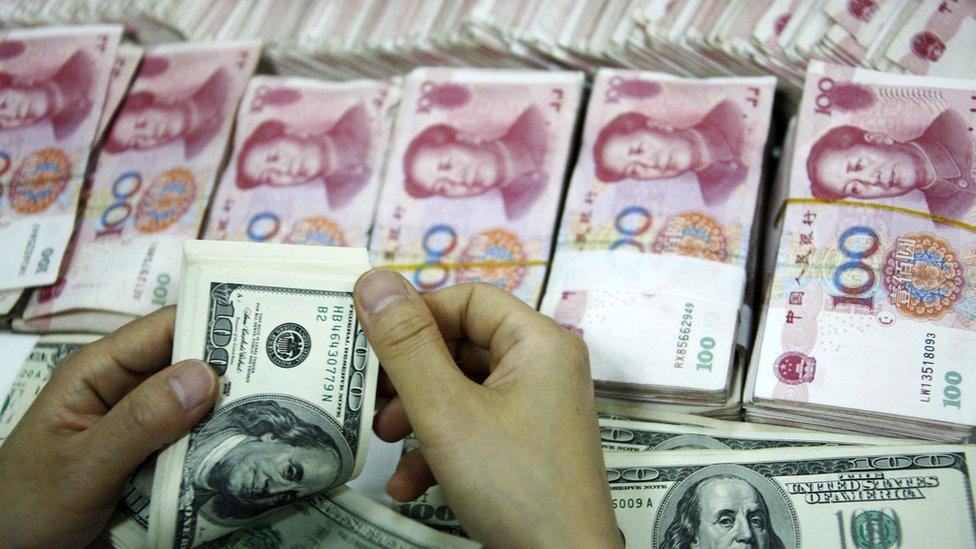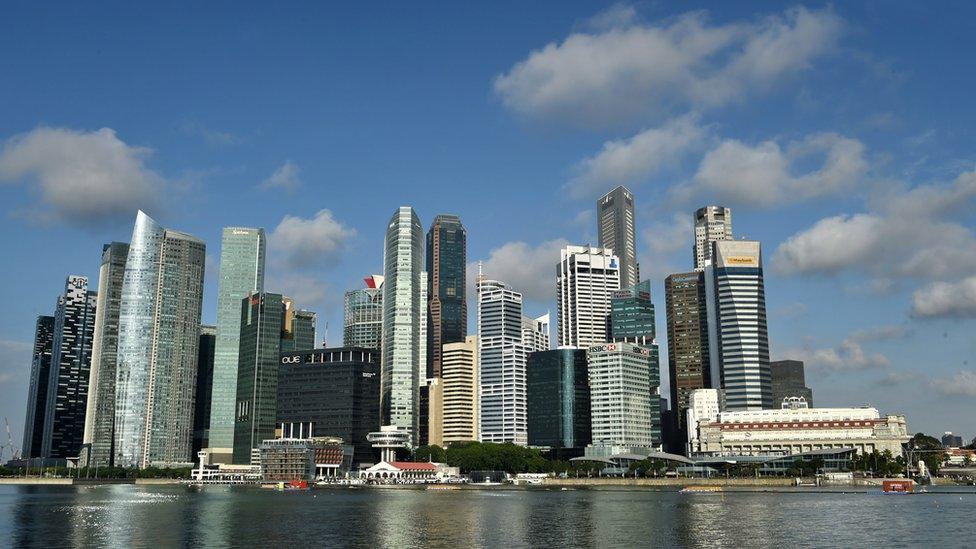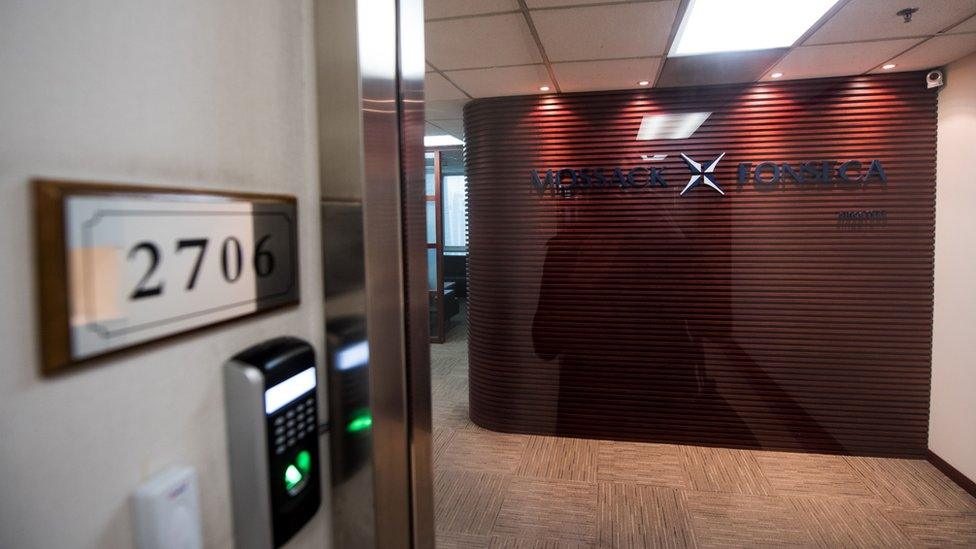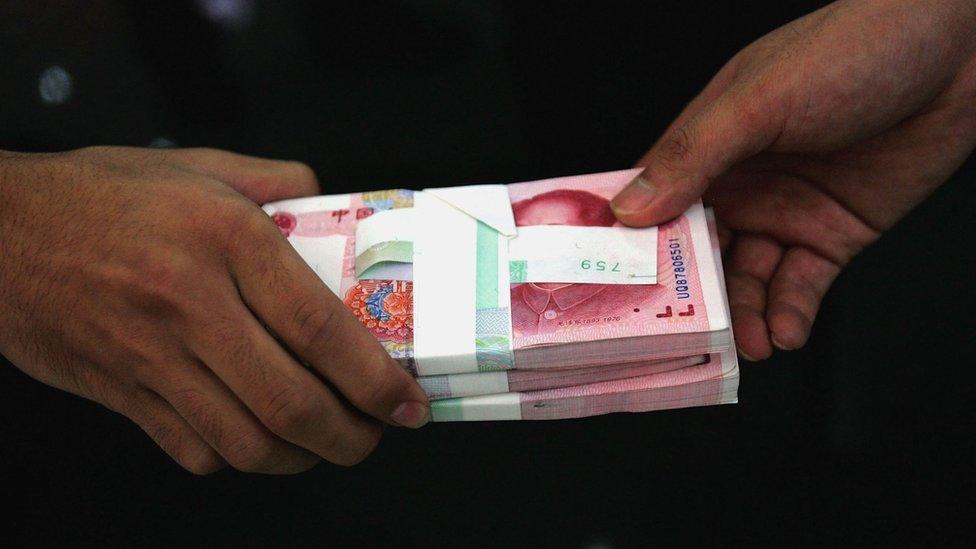Panama Papers: What next for Asia?
- Published
Some of the biggest global offshore banking centres are in Asia
Tax has never been so sexy.
Chances are by now you know all the gory details - allegations in the Panama Papers that the super-rich and politically connected, and even some of their relatives, have moved hundreds of thousands of dollars from their own countries into offshore accounts in Panama, Hong Kong and Singapore, amongst other places.
A lot of the international spotlight has been centred on the practice of offshore banking.
Some of the biggest global offshore banking centres can be found in Asia - Singapore, Macao, Dubai and Hong Kong, for example, are amongst the top spots for the global super-rich looking to open an offshore account.
The practice in itself isn't illegal, but Asian capitals have been under pressure to share more information about who account holders are, and where the money comes from. So will the Panama Papers force more governments to become more transparent about tax?

There is often a thin line between tax avoidance and tax evasion
Unlikely, says Andy Xie, an independent economist based in China and Hong Kong.
"In Asia it's about how to hide your wealth that often hasn't been legitimately acquired," says Mr Xie. "Political power and ill-gotten wealth go hand in hand here.
"How are you going to convince people to close these doors?"
Evasion v. avoidance
Now let's be clear - setting up an offshore account or an offshore company is perfectly legal.
But here's where it gets complicated. There is a difference between tax evasion and tax avoidance. And the devil is in the details.
Tax evasion, according to Paul Lau, tax partner with professional services firm PricewaterhouseCoopers (PwC), is when "someone has income to report and then doesn't report it."

Singapore is one of a number of major financial centres in Asia
So if you have income in that offshore account, that you haven't declared to tax authorities back in your home country, and you are required to report that income to them - then that could be illegal.
But tax avoidance is something a bit more "nebulous", as Mr Lau puts it.
"Tax avoidance is taking advantage of certain tax provisions in a way that is not within the intent of the provision, to avoid paying tax."
So that means - if you've found a perfectly legal way to avoid paying taxes because of a provision in the tax system - well, then depending on the country, you may not be doing anything illegal at all.
Lots of hedges and provisos here, but that's sort of the point.
"The world is dotted with states and territories that make a speciality of providing services whose purpose is to facilitate ways to hide assets," says anti-corruption advocacy group Transparency International.

The so-called Panama Papers were leaked from law firm Mossack Fonseca
Activists say it is time for these countries to reform the secret world of finance they operate and become more transparent.
"The enablers - the accountants, the lawyers, the business formation people - they're all involved," says Transparency International's Casey Kelso.
"They are all getting a great deal of money as a percentage of these profits from these transactions."
'Serious view'
But reforming these offshore banking centres won't be easy. This sort of business attracts billions of dollars for offshore banking centres every year, and it's not just from individuals. Massive profit-making corporations often set up shop in these centres to pay less tax as well.
Google, Apple, Microsoft, BHP Billiton and Rio Tinto - they're all household names - and all have admitted to being under audit by Australian tax authorities for using Singapore as a marketing and service hub.
They report hundreds of millions of dollars of income in Singapore, but pay lower tax on their money there than they would back in Australia, because of Singapore's lower tax rates.
The companies say they're not doing anything wrong, because Singapore is an important hub for them. But Australia says if money was earned from business done in Australia, tax should be paid there.

People have long sent money overseas to try to limit the taxes they have to pay
Both Singapore and Hong Kong have said they take a serious view of tax evasion and support international efforts to tackle cross-border transgressions.
The government here has been quick to point out its efforts to clamp down on any illegal activities.
"Singapore takes a serious view on tax evasion and will not tolerate its business and financial centre being used to facilitate tax related crimes," the Monetary Authority of Singapore said in a statement.
Singapore's Ministry of Finance added: "We are reviewing the information being reported in connection with the so-called Panama Papers and are doing the necessary checks.
"If there is evidence of wrongdoing by any individual or entity in Singapore, we will not hesitate to take firm action."
In fact, many Asian countries have committed to exchange more tax information by 2018 as part of the Automatic Exchange of Information initiative set up by the OECD. Singapore, Japan, Hong Kong and Australia have all signed up.
So if you're an Australian and you open a bank account in Singapore, by 2018 in theory, your government could know about it.
But critics say there's no incentive for countries who depend on offshore banking to do this. In fact, their business depends on keeping things secret.
"The livelihoods of these offshore financial centres depend on giving their clients confidentiality," says Mr Xie. "Otherwise why would people hide their money there?"
In the end, it's all about who goes first. Countries want a level playing field, because if one offshore banking centre starts opening itself to greater scrutiny, there's a very good chance their wealthy customers will flee, running to the next most secret place to park their cash.
And as we all know, where there's demand, there will always be a ready supply.